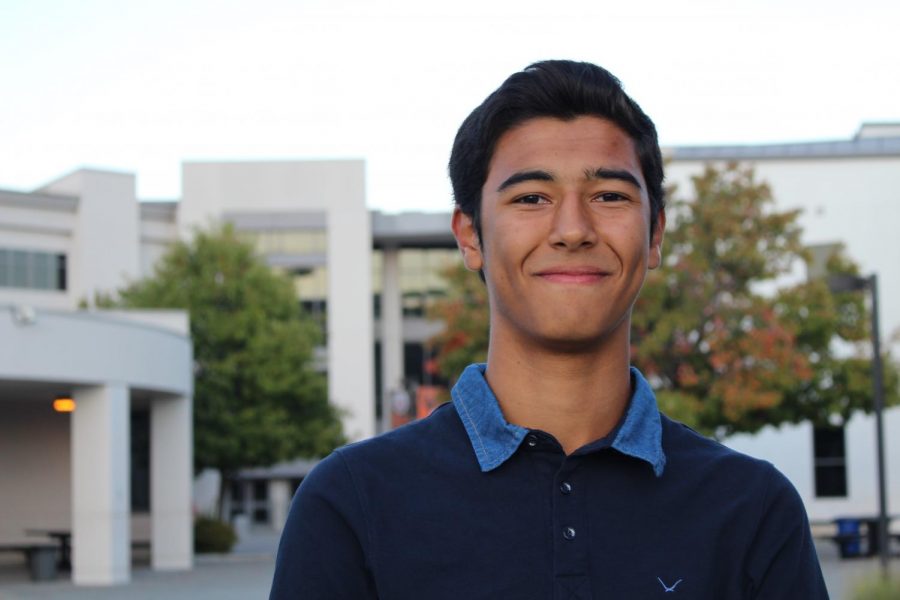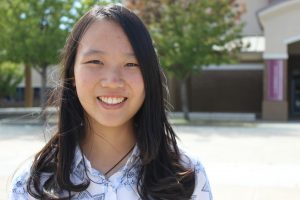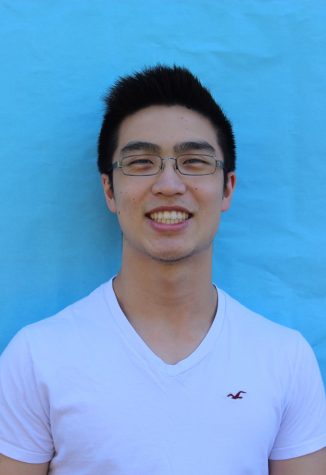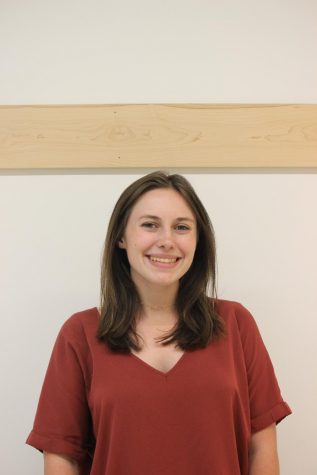Hear from Another World: Ali Turanalp adopts English to advance ahead
Former Wildcat and current Cal High junior Ali Turanalp discusses Islam and education from the perspective of his identity as a Turkish immigrant.
November 17, 2018
In August 2017, Ali Turanalp set foot on Californian soil for the first time. 14 hours earlier, he had left Turkey — the nation in which he had spent almost his entire life — with his younger twin brothers and parents on an airplane destined for San Francisco.
It was a risk to leave his home and country behind, but Ali and his family were willing to sacrifice comfort for the prospect of a better education and future for him and his brothers.
Ali recalled, “We were all so excited … We didn’t know how it was going to be; we were just guessing. And it was going to be, like, a completely different life in [the] U.S. We knew that it was going to be hard because of our language.”
That language barrier was the very reason that Ali’s father had decided to migrate to the U.S. Ali, his younger twin brothers and his older sister only bore a limited comprehension of English from their schooling in Turkey, and the entire family believed that being able to speak the global language was the key to future success.
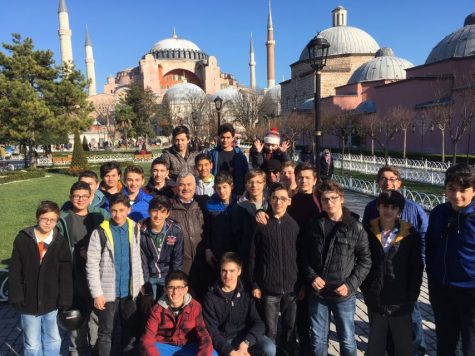
Ali had lived in the heart of Istanbul, Turkey, for nearly half of his life. Before immigrating to California, he attended Kadıköy Anadolu İmam Hatip Lisesi, a high school in Istanbul, for one year.
Thus, as his older sister stayed behind in Turkey to pursue a teaching degree, Ali and his family moved into their new house near California (“Cal”) High. Two weeks later, Ali began attending school — only, it wasn’t at Cal. Instead, Ali enrolled at Dougherty Valley under its English Language Development (ELD) program, which had incorporated Cal High’s at the start of the 2013-14 school year.
“My father asked us, ‘Would you like to go to Dougherty with a class, or would you like to go to Cal High?’ … My mom wanted Dougherty and my father wanted Cal High … So we chose Dougherty,” he said.
In the second month of the 2017-18 school year, Ali joined seven other English language learners in Dougherty’s Beginning ELD class. Described as a “hard worker” by English teacher Ms. Trista McCombs, Ali studied diligently to improve his reading and writing, while demonstrating speaking skills that were “strong compared to beginner students.”
“I could tell right away, maybe, he was a little bit more serious and mature than some of the students were in the beginning class. He focused on everything I said; he took all the feedback very, very seriously … and that’s going to make a huge difference later in life as he continues to study,” McCombs said.
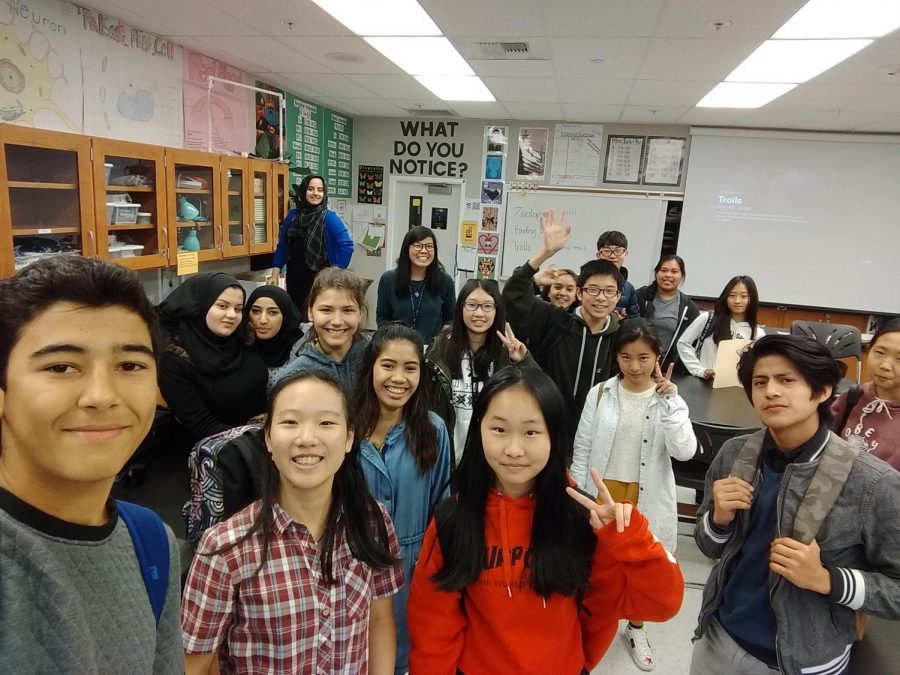
In his first year of school in America, Ali found friendship in the community of teachers and other immigrant students in Dougherty Valley’s ELD/SDAIE classes.
As he began to pick up the English language, Ali also embraced the ELD community of non-native speakers, who — supported by McCombs — helped each other in their mutual language-barrier struggles and accepted each other’s different backgrounds.
“We have a really tight community here of students who support each other. It takes a while to get out into the mainstream English classes and talk. When they start to develop a friendship and a community here … they feel a little bit safer, which is important,” McCombs said.
Surrounded by other English language learners at Dougherty, however, Ali was not able to practice conversational English as much as he possibly would have with native English-speaking peers. After his sophomore year, he and his family began to consider enrolling him as a regular student at Cal instead.
McCombs originally disagreed with the decision. “When [ELD students] leave, I always feel a little worried … Except for Ali and maybe one other student, I would have strongly advised them not to do it … There have been one or two that did it and were okay, but they still struggle. There tends to be a pretty significant dip in grades and academic performance,” she explained.
Nevertheless, believing that “talking more to people” was a faster way to learn — as well as considering the inconvenient distance between Ali’s house near Cal and Dougherty — Ali and his family decided to enlist him as a junior at Cal.
In August, Ali began his second year of high school in America. It was not long before he started making friends and getting involved in social activities at school.
“When I went to my first class, a girl saw me and just [sat] next to me, and we talked a little bit. I went to their table at lunch and brunch and I met two people in that table. One of these students in that table helped me to join [color] guard, and I met a lot of people,” Ali said.
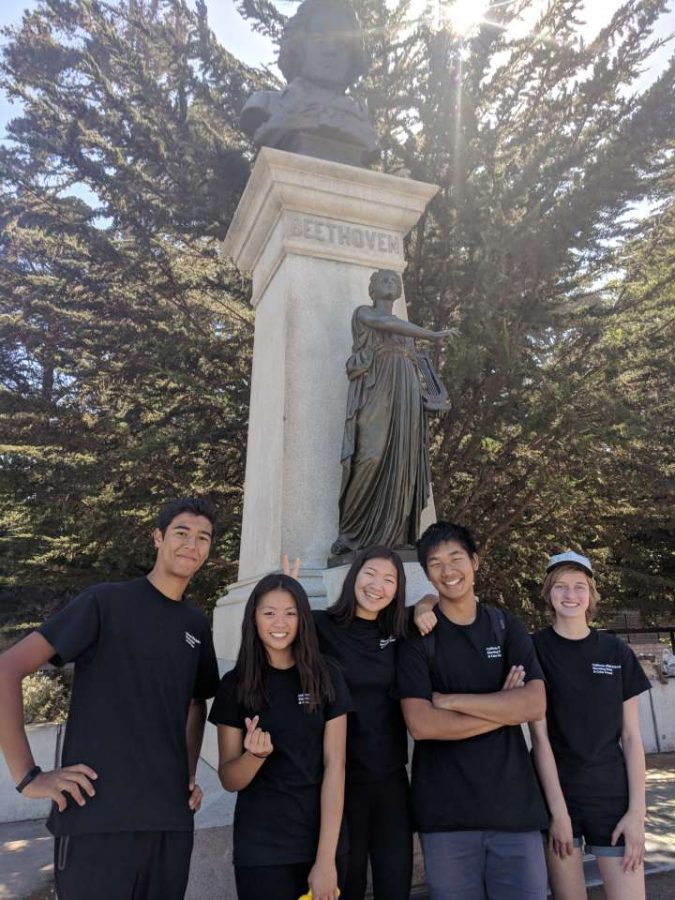
At Cal, Ali made a number of friends from a common interest in color guard (left to right: Kate Huang, Kristen Jackson, Cloud Cheung and Katrina Town).
By interacting with native speakers in class and especially in color guard, Ali is now able to practice his English and directly experience American culture. Still, even with the amount of time that he spends with these new ways of life, his religious identity remains strongly rooted within him.
Ali grew as a Sunni Muslim, the majority denomination in the largely-Muslim Turkey. While in Istanbul, Ali attended religious school for his secondary education in order to reinforce the religion that was an integral part of his family life.
He studied the traditional subjects taught in general schools — mathematics, sciences, pronunciation — in addition to religious history and Arabic. However, since Ali only began attending religious school from high school, and not since middle school like many of his peers, he had difficulty catching up with other students.
Nonetheless, he appreciated the religious intimacy that resulted from being surrounded with other members of the Islamic community. At his religious school, provisions were made for Namaz, the five daily prayers mandated by the faith.
However, Ali has found that in order to keep his faith close to him in the States, he must be more conscious of, and proactive in, practicing it.
“In Istanbul, most of the people around me were praying, like me. But here, people don’t, so I usually have to think about it [so I] don’t pass the times [for Namaz],” he said.
In his sophomore year at Dougherty, Ali continued his Namaz with the help of Ms. Sumeyye Cardakli — a former math teacher who was born in Turkey — who held regular lunchtime prayers for Muslim students. This year, however, Ali has not yet discovered any similar accommodation at Cal.
“I pray after school, usually. Sometimes I go to my house, and sometimes I go to the grass in the baseball field … I don’t really tell people about it,” Ali said.
Although Ali is not very vocal about his religion at school, he reflects that his friends and classmates respect his faith and that he has not experienced any sort of religious discrimination at Dougherty nor Cal. His immigration experience, however, has been blemished by the stain of Islamophobia before.
He recalls that on the flight to California from Istanbul on British Airways, a flight attendant acted rudely toward his family after seeing his mother’s hijab. Ali understands that after the terrorist attacks of the past few decades, the global community has gained many misconceptions about Muslims. Those stereotypes, he says, are misconstrued and misdirected.
“We never support terrorism … [Some terrorists are] Muslims, and they [made] a mistake or they were wrong. [But] it doesn’t mean that all Muslims are terrorists,” he said.
Even though religious facilities are far less accessible in the U.S. than in Istanbul, Ali finds himself going the extra distance — literally — to keep his faith close to him. After school and on weekends, he often bikes to the San Ramon Valley Islamic Center to attend prayer sessions. He cites his religion as a guiding force through his new life, helping him overcome many obstacles at school.
“If I do something harder for my religion, I feel closer to God. I feel better,” he said.
Much like his identification with Islam, Ali still considers himself to be Turkish rather than American. Even though meeting “with different cultures” was the second reason for originally migrating here, his national identity still stands with the country that he calls home.
One major element of this culture is Turkish cuisine. In America, Ali’s family continues to only eat foods that are halal, as prescribed by Muslim law. It has not an easy task to retain customs like this, especially after his mother returned to Turkey at the end of last year to support the family financially with a teaching job.
“It’s hard to be far from our mom … We have more responsibilities at home. We need to spend more time to make some foods … We do more work than we did before,” Ali said.
Another significant element of Turkish culture that differs from what he has observed in the U.S. regards his education. Similar to how DVHS junior and Indonesian immigrant Patricia Angelica described in the first of the “Hear from Another World” series, Ali feels that students in America are generally less personal with each other than students in Turkey are.
“In the U.S., we can see all cultures. But like, if we look from [the] general culture, there’s a big cultural difference … I feel like people are closer in Turkey. Maybe I feel that way because, like, I’m not enough close to people here. Maybe they’re closer than I thought,” he said.
Despite his perception of an underlying social uneasiness at school, Ali has a larger goal in mind for his education. He is active in Cal’s robotics club as well as his Principles of Engineering class, and is deeply interested in physics. Specifically, he aims to pursue a career in mechanical engineering.
Ali reflects that his decision to leave Turkey and separate his family was worth it for the education in English the States have offered him. In fact, the U.S. is now a major consideration in his plans for the future.
“I don’t want to move back … I would like to stay here until [I finish] high school, and if I can go to college here, I would like to … When I get older, I would like to live in the U.S., and maybe I could come here for my children to learn English,” Ali said.


